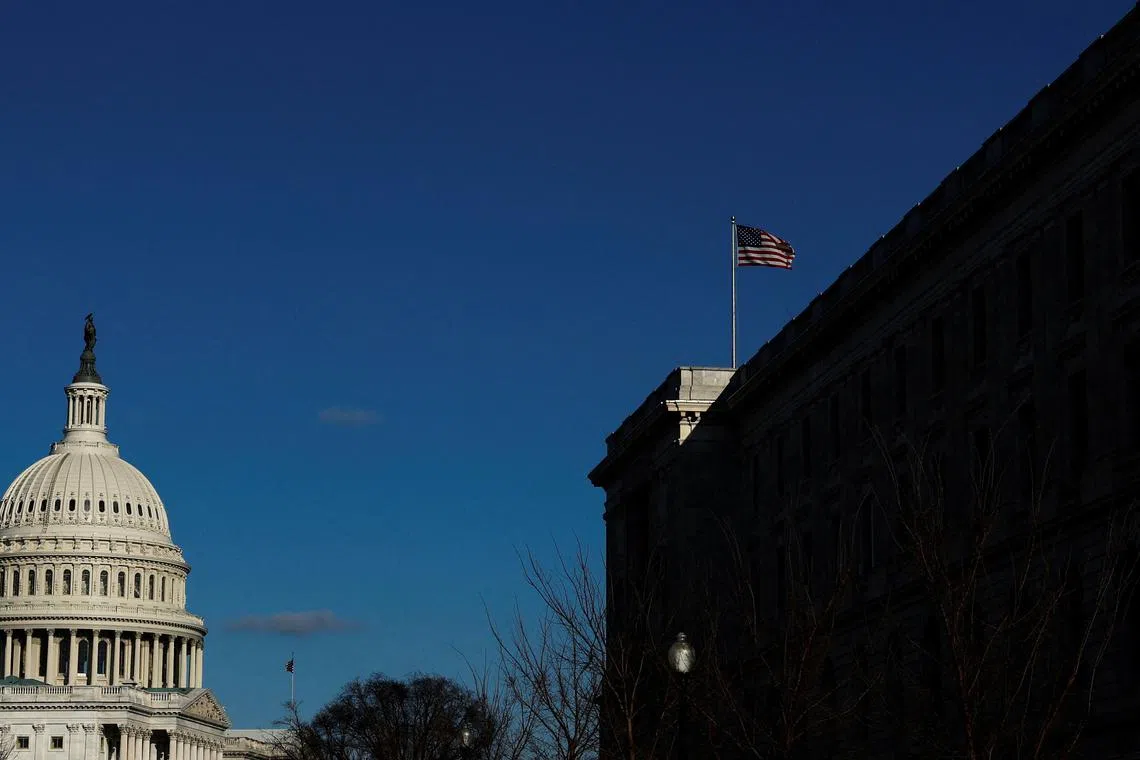Israel and US on alert for retaliatory Iran strike over embassy hit
Sign up now: Get ST's newsletters delivered to your inbox

The US is on high alert against a possible attack by Iran targeting Israeli or American assets.
PHOTO: REUTERS
WASHINGTON - Iran vowed on April 5 to avenge Israel’s killing of senior commanders and other officers
US officials in Washington and the Middle East said on April 5 that they were bracing themselves for possible Iranian retaliation for the Israeli air strike on April 1 in Damascus, Syria.
“We’re definitely at a high state of vigilance,” a US official said in confirming a CNN report saying an attack could come in the next week.
US military forces in the region have been placed on heightened alert.
According to an Israeli official, the military is on high alert, leave has been cancelled for combat units, some reservists have been recalled to air defence units and Global Positioning System signals have been blocked.
Two Iranian officials, who asked not to be named because they were not authorised to speak publicly, said their country had placed all its armed forces on full high alert and that a decision had been made that Teheran must respond directly to the Damascus attack to create deterrence.
“Our brave men will punish the Zionist regime,” General Hossein Salami, the commander-in-chief of Iran’s Islamic Revolutionary Guard Corps, told the crowd in Teheran attending the funeral of the officers killed.
“We warn that no act by any enemy against our holy system will go unanswered, and the art of the Iranian nation is to break the power of empires.”
The Israeli air strike hit a building that was part of the Iranian embassy complex in Damascus, killing three generals and four other officers of the Quds Force.
The force, an arm of the Revolutionary Guard, conducts military and intelligence operations outside Iran, often working closely with allies that oppose Israel and the US, including Syria, Hezbollah in Lebanon, and Hamas.
Iran’s Ambassador to the United Nations, Mr Amir Saeid Iravani, said on April 4 that he would give interviews to US news outlets “after Iran’s response to Israel”.
There are precedents for a forceful response by Iran. Four years ago, after the US killed the chief of the Quds Force, Major-General Qassem Soleimani
Although its proxy militias around the Middle East have launched a number of attacks on Israel since the war between Israel and Hamas began on Oct 7
Mr Hassan Nasrallah, the leader of Hezbollah, delivered a video speech that was broadcast in Iran and in Lebanon during the funeral, saying that a response from Iran could come any time and that “we must be prepared for all eventualities”.
“Be certain that the Iranian response to the targeting in Damascus is inevitably coming,” he said.
In the past few months, Israel has killed at least 18 members of the Quds Force, among them four senior commanders who were veterans of Middle East wars, according to Iranian media.
But the air strike in Damascus was far out of the ordinary, both in killing so many senior figures at once and in hitting a diplomatic building, normally considered off-limits in conflicts.
Israeli officials said the building functioned as a Revolutionary Guard base and so was a legitimate target.
The building housed the official residence of Iran’s ambassador to Syria, who said on state television that he and his family had left the building when it was hit.
The final decision on a matter as important as a strike against Israel rests with the Supreme Leader, Ayatollah Ali Khamenei, who is also the commander-in-chief of the armed forces.
It was Ayatollah Khamenei who ordered the 2020 attack in retaliation for the killing of Maj-Gen Soleimani.
US military analysts assess it is more likely that Iran would strike Israel itself than have its proxies attack American troops in the region, including in Iraq and Syria, as it did more than 170 times in the four months after the Hamas-led Oct 7 assault against Israel.
Those attacks against American targets stopped in early February, but Pentagon officials said they were watching the situation closely.
An Israeli defence official said that Israeli analysts had reached the same conclusion: that Iran itself would attack and not act through Hezbollah, its closest militant ally, which has been engaging in regular exchanges of fire with Israeli forces since the war began.
Israeli Prime Minister Benjamin Netanyahu said on April 4, before a security Cabinet meeting about a potential Iranian attack: “We will know how to defend ourselves, and we will act according to the simple principle of whoever harms us or plans to harm us – we will harm them.”
Lieutenant-General Alexus Grynkewich, the top US Air Force commander in the Middle East, told the Defence Writers Group in Washington this week: “From a military perspective, the biggest concern that I have is, does this lead to some sort of regional escalation? We’re watching very carefully; we’re listening to what the Iranians are saying in terms of how they intend to respond.”
He added: “I do continue to assess that the Iranians are not interested in a broader regional conflict.
“They want to take advantage of the crisis as it exists, but they’re not interested in war with Israel, war with the United States or war with anybody else right now.” NYTIMES, REUTERS


